Brief Papers
| Publication Cover | Title |
|---|---|
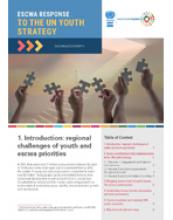 |
ESCWA response to the UN Youth Strategy, Social Development Bulletin, Vol 7, No. 2 E/ESCWA/SDD/2019/TP.2 Young people under 30 represent 60% of the total population of the Arab region today. The number of youth aged 15 to 24 is expected to increase from 71 million in 2015 to 92 million in 2030. This... |
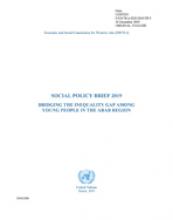 |
Bridging the Inequality Gap among Youth in the Arab Region E/ESCWA/SDD/2019/TP.5 This policy brief discusses selected dimensions of inequality among Arab youth and highlight the gaps and challenges that affect youth policy development and implementation. It concludes with a... |
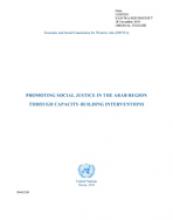 |
Promoting Social Justice in the Arab Region through Capacity Building Interventions, Social Development Bulletin, Vol.7, No.3 E/ESCWA/SDD/2019/INF.7 This bulletin explores the connection between innovative capacity building and the ability of stakeholders to implement the SDGs. It details the capacity building work undertaken by ESCWA’s... |
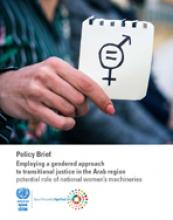 |
Policy Brief Employing a gendered approach to transitional justice in the Arab region: Potential role of national women’s machineries E/ESCWA/ECW/2019/BRIEF.3 The policy brief introduces the concept of ‘transitional justice’ and its key mechanisms that may influence post-conflict reconstruction or political transition. It argues that gendered concerns... |
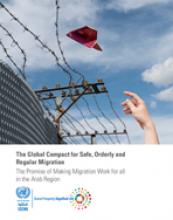 |
The Global Compact for Safe, Orderly and Regular Migration: the promise of making migration work for all in the Arab region E/ESCWA/CL2.GPID/2020/TP.5 The Social Development Bulletin describes the road to the historic adoption of the Global Compact for Safe, Orderly and Regular Migration in December 2018, its principles, objectives and... |
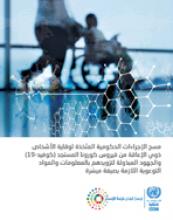 |
Mapping of government measures taken to protect persons with disabilities from COVID-19, and efforts to provide accessible information and awareness materials E/ESCWA/CL2.GPID/2020/INF.5 Persons with disabilities are among the most vulnerable groups when it comes to the COVID-19 pandemic. They may be more vulnerable to respiratory diseases, and complications that may result... |
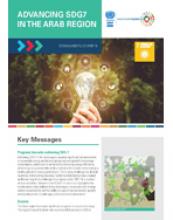 |
Advancing SDG7 in the Arab Region E/ESCWA/2020/POLICY BRIEF.16 Achieving SDG 7 in the Arab region requires significant advancements in renewable energy and in decoupling regional growth from energy consumption, which can be achieved by improving energy... |
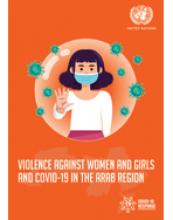 |
Violence against Women and Girls and COVID-19 in the Arab Region The policy brief is based on the collective work of United Nations agencies active in the Arab region. Launched during the 16 days of activism against gender-based violence, the policy brief... |
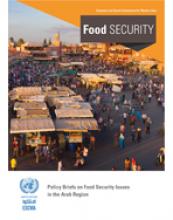 |
Policy Briefs on Food Security Issues in the Arab Region E/ESCWA/SDPD/2018/TP.7 The policy briefs provide key policy recommendations to enhance food security in the Arab region, with a focus on issues pertaining to agriculture productivity, engagement with world food markets... |
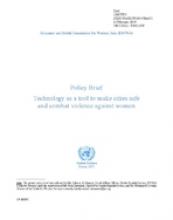 |
Technology as a tool to make cities safe and combat violence against women E/ESCWA/ECW/2019/Brief.1 The Arab region is witnessing an unprecedented urbanization boom accompanied by diverse challenges including sexual violence and harassment of women in public spaces. This challenge is an... |
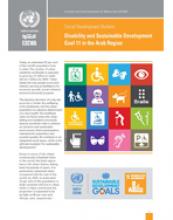 |
Disability and SDG 11 in the Arab Region, Social Development Bulletin, Vol. 7 No. 1 E/ESCWA/SDD/2018/TP.2 SDG 11 aims to "make cities and human settlements inclusive, safe, resilient and sustainable". In order to achieve this in the highly urbanized Arab region, it is critical that cities make... |
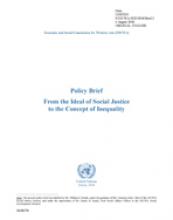 |
Policy Brief: From the Ideal of Social Justice to the Concept of Inequality E/ESCWA/SDD/2018/BRIEF.2 The concept of social justice has recently regained interest among analysts, thinkers and institutions, as the claim for democracy and the claim for social justice were the main motivations... |
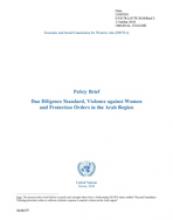 |
The Due Diligence Standard, Violence against Women and Protection Orders in the Arab Region E/ESCWA/ECW/2018/BRIEF.2 As of 2018, six Arab States have implemented stand-alone violence against women laws, with other States having draft legislation underway. Such legislation may outline social, legal and/or... |
 |
Women in the Judiciary: A Stepping Stone towards Gender Justice E/ESCWA/ECW/2018/BRIEF.1 The limited presence of women in the judicial branches of Arab States is attracting increasing attention as an obstacle to the development of representative institutions and the achievement of... |
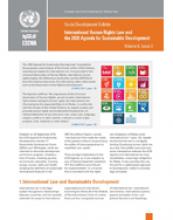 |
International Human Rights Law and the 2030 Agenda for Sustainable Development: Social Development Bulletin, Vol 6 No. 3 E/ESCWA/SDD/2017/TECHNICAL PAPER.8 The 2030 Development Agenda expresses the commitment of the United Nations to accelerate development efforts and to leave no one behind. Parts of this aspirational agenda are also enshrined in... |
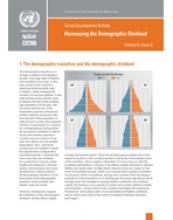 |
Harnessing the Demographic Dividend: Social Development Bulletin Vol 6, No. 2 E/ESCWA/SDD/2017/TECHNICAL PAPER.6 This bulletin sheds light on the changes in age structure that result from the interplay between population dynamics and create a demographic window of opportunity that could lead to rapid... |
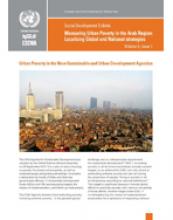 |
Measuring Urban Poverty in the Arab Region: Localizing Global and National strategies, Social Development Bulletin, Vol 6, No. 1 E/ESCWA/SDD/2017/TECHNICAL PAPER.2 This bulletin examines how urban poverty is addressed in the 2030 Agenda, the Sustainable Development Goals (SDGs) and the New Urban Agenda (NUA). It also considers urbanization and urban... |
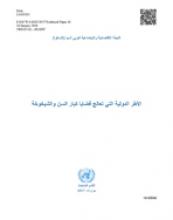 |
Global Frameworks on Older Persons E/ESCWA/SDD/2017/TECHNICAL PAPER.16 This paper discusses all the dimensions of the global frameworks regarding older persons including the ICPD plan of action (1994), the Madrid International Plan of Action on Ageing (2002), and... |
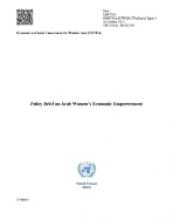 |
Policy Brief on Arab Women’s Economic Empowerment E/ESCWA/ECW/2017/Technical Paper.6 This policy brief presents several strategies that could be applied in the Arab region to advance women’s economic participation. In the Arab region, social, economic and political factors... |
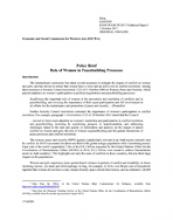 |
Policy Brief: Role of Women in Peacebuilding Processes E/ESCWA/ECW/2017/TECHNICAL PAPER.5 The policy brief examines the participation of women in peace building processes in several Arab countries. It presents some key arguments supporting women’s participation in peace building... |





